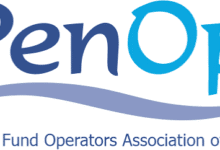No Employee Of PenCom Earns N1m Monthly Salary -Management

The Management of the National Pension Commission (PenCom) has clarified that its highest paid official earns less than one million naira monthly salary.
PenCom in a statement on Saturday, September 17, 2022 said, it was therefore, completely illogical and improbable that the least paid employee would earn a monthly salary of ₦3 million as allegedly reported in the media.
The Commission who said that the clarification was meant to set the record straight in the interest of the Nigerian public, described the report as false, misleading and mischievous, consequently, urged the public to disregard it.
PenCom said: “It is being alleged that the least paid PenCom employee earns a salary of ₦3 million per month.
“This has fueled all sorts of false allegations and unfair insinuations. The public is invited to note that the claim is absolutely false.
“The highest paid official of the Commission earns less than ₦1 million a month. It is therefore completely illogical and improbable that the least paid will earn a monthly salary of ₦3 million.
“We understand that there is an element of mischief and possible blackmail on the Commission’s compensation package.
“From our understanding, it appears someone calculated all staff costs, including training, staff exit benefit scheme, and employer’s pension contribution, and divided the total by the number of the Commission’s employees and concluded that the least paid employee is on a monthly salary of ₦3 million. There is a clear difference between staff cost and staff salaries”, it said.
The Commission noted that the no compensation review has been done in the last five years, adding that the
last compensation package review was done in 2017 with the approval of the Office of the Secretary to the Government of the Federation (OSGF).
“It is imperative to point out that right from the inception of the Commission in 2004, the Federal Government mandated the Board to adopt an employee compensation policy that favorably compares to comparator government bodies in the financial services sector, such as the Central Bank of Nigeria (CBN), the Nigeria Deposit Insurance Corporation (NDIC) and the Securities and Exchange Commission (SEC). Section 25(2)(b) of the Pension Reform Act 2014 also empowers the Board of the Commission to fix the remuneration, allowances and benefits of the employees.
“More so, the Presidential Committee on the Consolidation of Emoluments in the Public Sector headed by the late Chief Ernest Shonekan, former Head of the Interim National Government, made a number of recommendations which guide the PenCom Board in its compensation review exercises.
“One of the recommendations is that the pay structure of self-funded agencies should be benchmarked with their private sector comparators so as to ensure relativity in such agencies and attract and retain high-caliber professionals.
“The Shonekan Committee, which was set up by former President Olusegun Obasanjo in 2005, also recommended that the pay structure of regulatory agencies should be benchmarked against sectors they monitor to avoid regulatory capture, and that an annual increase in pay should be undertaken to account for inflation/cost of living adjustment and establishments may strive to attain 50th percentile and above their comparators in the private sector.
“We made all these facts known in a recently submission to the House of Representatives Committee on Finance over the compensation package of the Commission.
“We also stated that the last compensation package review was done in 2017 with the approval of the Office of the Secretary to the Government of the Federation (OSGF).
“No review has been done in the last five years and this has affected the ability of the Commission to attract, hire and retain staff with competitive skills.
“The public is, therefore, implored to ignore the false and mischievous information on the staff compensation package. The Commission has nothing to hide and will continue to run a transparent and accountable system”, PenCom said.





